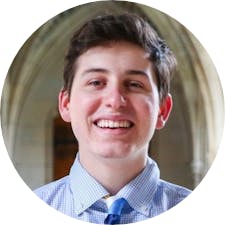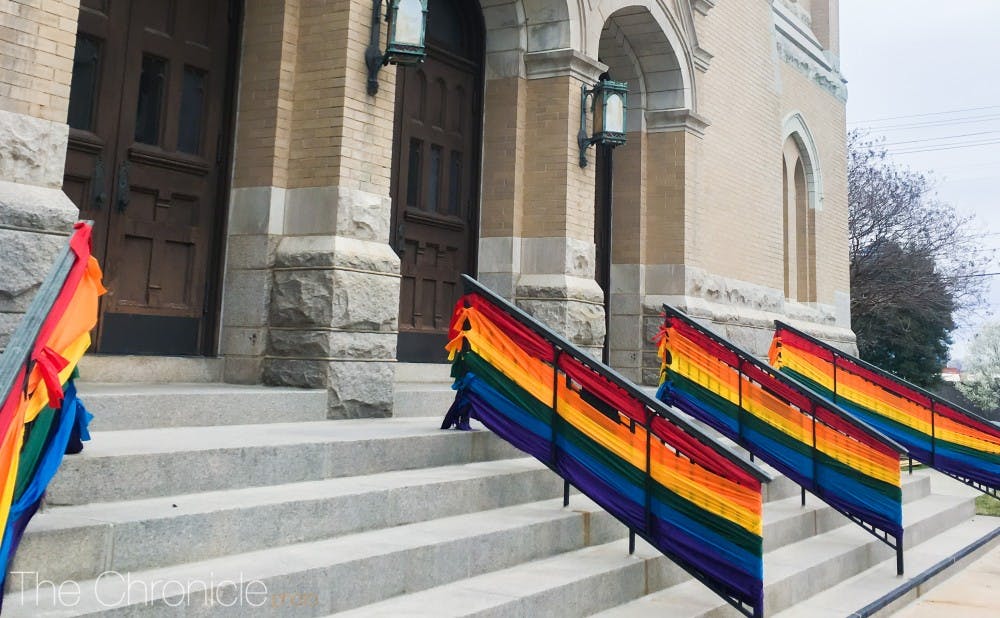On the way home from church this past month, Jennifer Ingold Asbill’s seven-year-old daughter asked her why their church had rainbow banners strung up on the railings, visible to anyone driving through the thick fog that blanketed downtown Durham.
How does a parent answer that question? The answer involves faith, politics, community, sexuality—not easy concepts for a child to grasp. So Asbill, pastor for children and pastoral care at Duke Memorial United Methodist Church and Divinity '08, replied as honestly as she could.
“‘The rainbows were there, this week particularly, because our family and our church family and a lot of our friends believe that when you grow up you can love whoever you want to,’” she told her daughter. “‘We decided as a church that we wanted to put up the rainbow flags to remind everyone that God loves everyone.’”
The past month had been a difficult one for the United Methodist Church. Its General Conference—the global representative body that makes decisions for the entire denomination—voted Feb. 26 to strengthens bans on same-sex marriages and the ordination of LGBTQ+ clergy.
Duke joined 92 Methodist-affiliated colleges in signing a statement in January urging full inclusion of LGBTQ+ individuals in the Methodist Church. Last March, students at the Divinity School interrupted the Divinity School State of the School address to protest in support of LGBTQ+ issues. Elaine Heath, then-dean of the Divinity School, stepped down in August.
Duke Divinity School is one of the 13 United Methodist seminaries. It receives financial support from the denomination, and the University has had close ties to the congregation.
“Put simply, we will work to ensure that all are welcome to pursue study and preparation for Christian ministry at Duke Divinity School,” Divinity School Dean L. Gregory Jones said in a statement following the decision.
Despite the rainbows and support, the aftermath of the General Conference's decision has not been easy for Methodist churches in Durham and Raleigh, including the Divinity School.
Two main plans were proposed. The One Church Plan would have allowed individual churches to determine their marriage policy. The Traditional Plan, which passed the General Conference with 53 percent of the vote, affirms the current bans and amplifies punishments for clergy who marry LGBTQ+ couples.
However, following a further review, at least four ballots were cast by non-voting members. Although the number of these ballots is smaller than the 54-ballot margin by which the vote passed, some church leaders are now calling for a new vote.
Before the vote, the UMC’s Book of Discipline—its constitution—had affirmed the “sacred worth” of all people, yet it also stated that “the practice of homosexuality" is "incompatible with Christian teaching.” The Traditional Plan didn’t change the rules against same-sex marriage or clergy already in place, but it enacted universal punishments for clergy who break the rules regarding homosexuality.
The United Methodist Church is the third largest Christian denomination in the United States, following the Catholic Church and the Southern Baptist Convention. Twelve million Methodists—seven million in America alone—are affected by this decision and face the choice to remain in or leave the church.
But many churches cannot make plans for their futures, since the UMC’s Judicial Council is currently reviewing how the Traditional Plan accords with the Book of Discipline. Due to the confusion surrounding the decision, Duke Memorial has no current plans to leave the General Conference. The church has not been asked to perform any same sex marriages, but Asbill said the church will address that when necessary.
Divinity School Chaplain Meghan Benson expressed her “heartsick at the hardening of hearts” in an email. She also provides pastoral care, so she’s been focusing on engaging students who are in pain over the decision. After the vote, she had a gathering with an LGBTQ+/Ally student group, and she wrote a prayer litany to help ease people through their grief.
“What are the gifts of God that we are discarding with our rejection?” she wrote in the email. “What might Christ be teaching the church in this generation through the witness of our LGBTQIA+ friends?”
William Willimon, a retired Methodist bishop and professor of the practice of Christian ministry at Duke Divinity School, was at the General Conference and advocated for the One Church Plan.
“Issues of sexual orientation are worked out in every congregation I know,” he said.
Willimon said that a majority vote may work in American politics, but it creates deeper divisions within religious conferences.
“Nothing was really decided, but a lot of damage was done,” he said.
The General Conference’s vote mirrors the political landscape of America today, with Willimon likening it to an “ecclesiastical mirror” of a political convention.
As a result of the General Conference’s decision, congregations across the country must now confront an issue long ignored and pushed to the side.
But these conversations may be happening more quickly than is healthy, Asbill said. She said that a lot of the same fears that divide people along political lines also divide them along theological ones, and that living in a bubble means that people forget there are others who think very differently than they do.
These divisions can exist within single churches as well. At North Raleigh United Methodist Church, the congregation is split down the middle, according to Senior Pastor Duke Lackey, Divinity ‘87.
Lackey stressed that for some, the Bible prohibits same-sex marriage, which settles the debate. For others, those few passages are outweighed by Jesus’s message of love.
Regardless of the General Conference’s decision, he said he will continue to affirm the “sacred worth” of his LGBTQ+ congregants and embrace them, despite not being able to marry them. When asked if he would marry them if he were permitted, he paused.
“I'm going to follow the Book of Discipline, and if the Book of Discipline allowed it, then yes, I would be willing to do that,” he answered.
The question of sexual orientation is not the first challenge the Methodist Church has faced. Willimon grew up in a racially segregated South Carolina. After getting his Master of Divinity from Yale, he returned to his home state, preaching messages of love for people of all races and backgrounds.
“When I went back, I knew I was going back into a war,” he said. “I knew there would be arguments, but it was kind of invigorating.”
He knew his messages wouldn’t always be well received, but he wanted to make a difference. He likens that political climate to the challenges young divinity students—especially those who identify as LGBTQ+—face today in educating those who oppose their rights.
In fact, the decision has made him feel better about the teaching he does at the Divinity School, where he prepares the next generation of Methodist preachers to tackle the political realities of Methodism today.
For her sermon on the Sunday after the vote, Heather Rodrigues, pastor of Duke Memorial UMC, incorporated the confusion and grief of the entire congregation, sharing that members of the LGBTQ+ community have higher rates of depression, suicide and homelessness. She told stories of Methodists who no longer felt comfortable in the church due to the General Conference’s decision, and said that she herself had no idea what would happen next.
At communion, six members of the LGBTQ+ community were granted the honor of handing out sacred bread and wine in a show of support from their church and their faith.
And speaking directly to LGBTQ+ members of the church, she said, “I see you. I love you, beautiful children of God. And whatever happens next, we lean in with love.”
Get The Chronicle straight to your inbox
Signup for our weekly newsletter. Cancel at any time.

Jake Satisky is a Trinity senior and the digital strategy director for Volume 116. He was the Editor-in-Chief for Volume 115 of The Chronicle.

